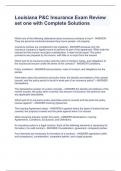Louisiana P&C Insurance Exam Review set one with Complete Solutions Which one of the following statements about insurance contracts is true? - ANSWER-
They are personal contracts because they insure people, not property.
Insurance policies are considered to be unilateral - ANSWER-because only the insurance company is legally bound to perform its part of the agreement. While both the
insured and the insurer must give consideration, it need not be equal. The policy provisions are prepared by the insurer, with little or no input from the insured
Which part of an insurance policy sets the rules of conduct, duties, and obligations of the insured and insurer under the terms of the contract? - ANSWER-Conditions.
Policy conditions - ANSWER-set provisions, rules of conduct, and obligations for the parties.
Information about the premium and policy limits, the identity and address of the named insured, and the policy period is found in what part of an insurance policy? - ANSWER-
Declarations.
The declarations section of a policy includes - ANSWER-the identity and address of the named insured, the policy term or period, the amount of insurance, the premium and any applicable deductibles.
Which part of an insurance policy describes what is covered and the perils the policy insures against? - ANSWER-Insuring Agreement
The Insuring Agreement states - ANSWER-in general terms the types of losses that are covered, the property covered and the perils against which it is insured.
Most insurance policies contain five parts - ANSWER-Declarations, Insuring Agreements, Conditions, Exclusions, and Definitions.
An insurance policy is a legal contract. Each of the following elements is necessary for formation of a valid contract - ANSWER-Consideration, agreement, competent parties.
Four elements are necessary for formation of a contract: - ANSWER-agreement (offer and acceptance), consideration, competent parties, and a legal purpose. In the property and casualty insurance field, the principle of making someone 'whole' again after a loss, by paying only for actual losses, is called - ANSWER-indemnity.
Most property and liability insurance is written on an indemnity basis -- - ANSWER-the intent being to make someone 'whole' again by paying actual losses while preventing any gain.
Because an insurer writes the policy language and the insured has little or no control over the content, any ambiguity in the wording is usually resolved in favor of the insured. Since the design and wording of a policy are in the hands of the insurer, insurance policies are said to be - ANSWER-contracts of adhesion.
In the insurance business, an insurer writes the contract and the insured simply 'adheres' to it. Because these are contracts of adhesion, - ANSWER-any ambiguity is interpreted in favor of the insured.
An insurance policy is a legal contract. Each of the following elements is necessary for formation of a valid contract - ANSWER-Consideration, agreement, competent parties.
Four elements are necessary for formation of a contract: - ANSWER-agreement (offer and acceptance), consideration, competent parties, and a legal purpose.
In the property and casualty insurance field, the principle of making someone 'whole' again after a loss, by paying only for actual losses, is called - ANSWER-indemnity.
Most property and liability insurance is written on an indemnity basis - ANSWER-the intent being to make someone 'whole' again by paying actual losses while preventing any gain.
Because an insurer writes the policy language and the insured has little or no control over the content, any ambiguity in the wording is usually resolved in favor of the insured. Since the design and wording of a policy are in the hands of the insurer, insurance policies are said to be: - ANSWER-contracts of adhesion.
In the insurance business, an insurer writes the contract and the insured simply 'adheres' to it. Because these are contracts of adhesion, - ANSWER-any ambiguity is interpreted in favor of the insured.
In the formation of a legal contract, each party must give up something of value. Under contract law this is referred to as: - ANSWER-consideration
Each party to a contract must give valuable consideration. It may take any one of several forms - ANSWER-money, an act, a promise, or the giving up of a legal right.
Which one of the following statements about insurance contracts is true? - ANSWER-
They are personal contracts because they insure people, not property.




